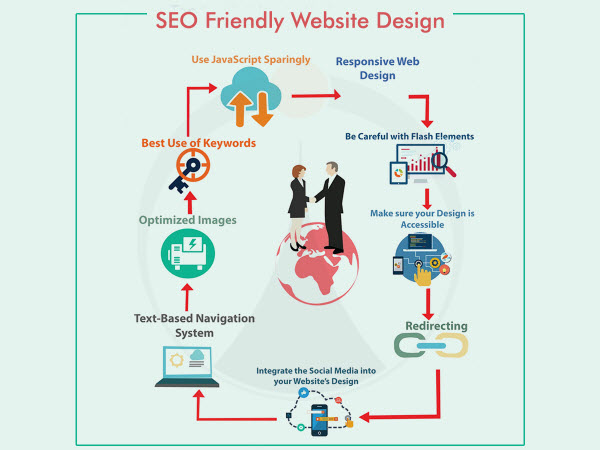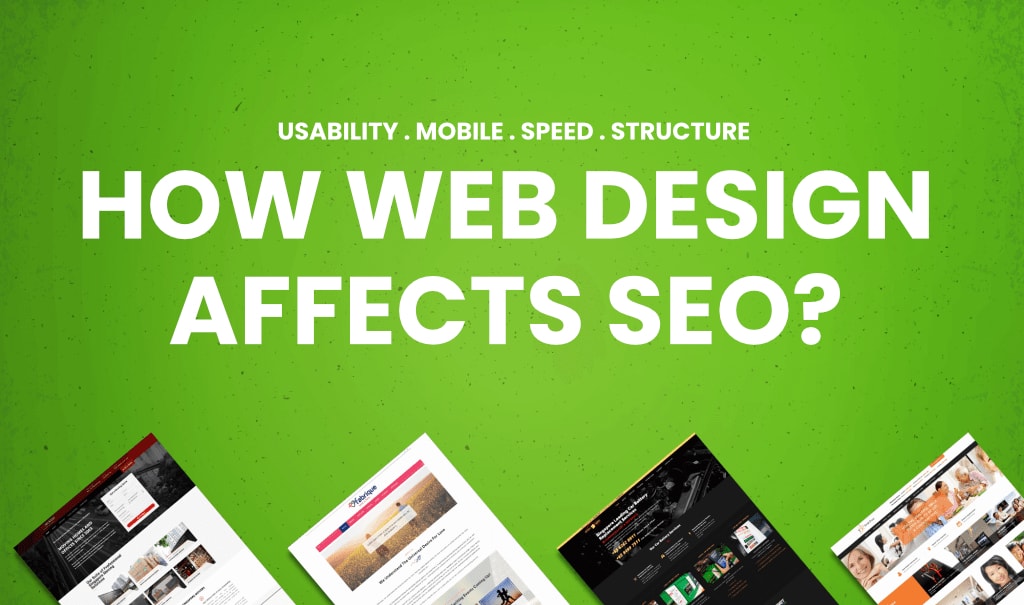Digital Marketing & Website Development | Posted on | others
Does web design affect SEO?
Dietitian | Posted on
Whether the Internet is your day job or not, chances are you’ve wondered how to become a better web designer. If you’ve ever wanted to learn how to design websites from scratch or improve your existing skillset, we have some tips and insights for you. Whether you're looking for more information about HTML, CSS, JavaScript, PHP and/or MySQL coding languages or just want to know how to design a website properly and impressively.

0
0 Comment
| Posted on
Yes, definitely the website design can affect SEO. When it comes to search engine rankings, Google favors websites above other forms of web pages (such as blogs). So, if you want your company or brand to be found on the internet, you'll need a website that performs well on search engine results pages. So, the Web design is a significant component in determining where your website will appear in Google's search results pages. The good site design has an impact on every aspect of your online presence. The first place people go to learn about your organization is your website, and it's also the key to enhancing your search engine presence. A good design is beneficial to your SEO ranking, whereas a bad design is detrimental. Web design also boosts your authority, making it easier for users to trust you.
You may unintentionally make it difficult for crawlers to index your site, resulting in a decline in SEO rankings, if you make bad web design decisions.
People will spend more time on your website if it has a solid UX (User Experience) and logical architecture. For search engines, the amount of time spent on your website is a ranking consideration.
0
0 Comment
| Posted on
Yes, web design significantly affects SEO (Search Engine Optimization). Here's how:
- Page Loading Speed:
Web design plays a crucial role in determining how fast your website loads. A well-structured and optimized design can lead to faster loading times, which is a positive ranking factor for search engines like Google. Slow-loading websites often rank lower. - Mobile Friendliness:
Responsive web design, which ensures your site adapts to various screen sizes and devices, is a critical aspect of SEO. Google gives preference to mobile-friendly websites in its rankings since mobile usage is widespread. - User Experience (UX):
A good web design focuses on user experience, which includes easy navigation, clear call-to-action buttons, and an intuitive layout. When users have a positive experience on your site, they are more likely to stay longer, engage with your content, and reduce bounce rates – all of which can positively impact your SEO rankings. - Content Presentation:
Web design affects how your content is presented. Proper headings, clear fonts, and well-organized content make it easier for search engine bots to crawl and index your pages. This can improve your SEO by ensuring that search engines can understand and rank your content effectively. - Structured Data Markup:
Effective web design can incorporate structured data markup, which helps search engines better understand the content on your site. This can result in rich snippets and enhanced search results, potentially increasing click-through rates. - Internal Linking:
A well-designed website can facilitate effective internal linking, allowing you to connect related content. Internal links improve the user experience and help search engines discover and index more of your pages. - Image Optimization:
Proper image optimization within the design, such as using descriptive alt tags and compressing images for faster loading, can positively impact SEO, especially in image search results. - Security: Secure website design (e.g., implementing HTTPS) is an SEO ranking factor. Search engines give preference to secure websites in order to safeguard user data and privacy.
In summary, web design directly influences several aspects of SEO, from technical factors like site speed and mobile-friendliness to user experience and content presentation. A well-optimized website design can contribute significantly to improved search engine rankings and overall online visibility.

0
0 Comment
Are you planning a website? Great! Well, I personally recommend folks to use WordPress as it is more SEO-friendly. What other content management software fails to serve for the speedy growth of your website, WordPress makes it available for free. Here’s how WordPress is the best from an SEO perspective.
- Focuses on user experience: Other CMS platforms may be visually satisfying but serve no meaning or benefit when it comes to user experience. On the contrary, WordPress's easy-to-use features are adjustable and customizable and focus on serving a great user experience.
- Encourages SEO friendly actions: You can create custom or SEO-friendly permalink, understand keyword density, attractiveness of title, adjust metadata, and structure your content in an ideal format on a WordPress site.
- SEO optimized images: By installing and running some good plugins in WordPress, you can optimize images of your posts and give them title tags and alt tags, ensuring traffic comes from all types of searches.
- Site speed: Cookies or excessive java scripting or coding work can halt the performance of your web pages. They may load slowly. But thanks to WordPress plugins as they allow you to sort out all these hassles with one click. Site speed is the primary factor that may impact the SEO of your website. Because the slow loading time of web pages leads to an increased amount of bounce rate.
- Social media integration: On a single click, you can even share your web post on social media platforms to keep your website stuffed with users and traffic that automatically pushes your website up on the searches.
WordPress is a one-stop-solution to get a feature-rich website. But if you are a fresher, it can be a bit confusing. Still, you can outsource SEO services and ask them to build your website on WordPress.
0
0 Comment
| Posted on
Yes, web design plays a crucial role in SEO (Search Engine Optimization). The way your website is designed can impact how search engines like Google index and rank your site. Here are several ways in which web design affects SEO:
-
Site Structure and Navigation: A well-organized site structure allows search engines to crawl your pages easily. Clear navigation helps users find content quickly, improving user experience, which search engines reward.
-
Mobile Responsiveness: Google prioritizes mobile-friendly websites in its rankings. If your design isn't responsive (adapting to mobile devices), it can negatively impact your SEO.
-
Page Load Speed: Slow loading times frustrate users and can lead to higher bounce rates, which signals to search engines that your site isn't user-friendly. Optimizing your design for speed is critical for both SEO and user retention.
-
Image Optimization: Large, unoptimized images can slow down your site. By using compressed, properly labeled images (with alt tags), you improve both load time and accessibility, which enhances SEO.
-
User Experience (UX): A well-designed website enhances the overall user experience. When users spend more time on your site and interact with content (lower bounce rate), it signals to search engines that your site is valuable, improving SEO.
-
Clean Code: A clean, well-structured HTML/CSS code is easier for search engines to crawl and understand, helping boost rankings.
-
SSL Certificate: Secure websites (HTTPS) are prioritized by search engines. An SSL certificate ensures your site is secure, which is both a design and technical SEO factor.
0
0 Comment
nehagoyal022@gmail.com | Posted on
Yes,Web design affects SEO.Wordpress is best site for web designing.The factors on which Website depends:
- Content Optimisation:The content of your website should be unique.
- Keyword:Website must be Ranked on Keywords.Keyword is a word on which website was ranked.
- Keyword Cannibilisation:When you have various web pages on your site that can rank for the same search query in search engine.
- Image Optimisation:To decrease page load time of website Image compression is necessary.
- URL Optimisation:Optimise the website address.
- Title Tag Optimisation:Title tag must have include primary keyword.
- Keyword Stuffing:On whole website their shouldn't be Keyword stuffing.
-
Redirecton:It is safe to say that a user will likely quit your website if he encounters a 404 error page.

0
0 Comment
| Posted on
Yes, web design significantly affects SEO (Search Engine Optimization). A well-designed website with a clear and logical structure, fast loading times, and mobile responsiveness enhances the user experience, which is a crucial ranking factor for search engines like Google. Clean and organized code, proper use of headings, and image optimization contribute to better SEO by making it easier for search engine crawlers to understand and index your content. Additionally, a responsive design that adapts to various screen sizes improves user accessibility and can positively impact your SEO rankings, as search engines prioritize mobile-friendly websites. Therefore, investing in good web design practices not only improves user engagement but also plays a vital role in boosting your website's search engine visibility and rankings.

0
0 Comment
Student | Posted on
Web design profoundly impacts SEO. A well-structured, mobile-responsive site with fast loading times, intuitive navigation, and user-friendly content presentation can improve search engine rankings. Google prioritizes user experience, penalizing slow or unresponsive sites. Additionally, a clean URL structure, proper image optimization, and secure design contribute to SEO success. Structured data markup enhances search results, while cross-browser compatibility ensures broad accessibility. Essentially, web design isn't just about aesthetics but also about creating a functional and user-centric platform that search engines reward with higher visibility in search results, ultimately driving organic traffic to your site.

0
0 Comment
| Posted on
Absolutely, web design does affect SEO. Often, people associate SEO with the technical aspect of a website. There are specific things you do to optimize a website for search engine visibility like keyword research and optimized content, URLs and meta tags, as well as link building techniques. However, why a website is appealing (or not visually appealing) to users matters too.

This is unfortunately overlooked sometimes. If your website lacks a modern look or unique visual elements, and if it’s visually challenging to navigate or read through the various pages and posts on your site Google will pick up on this. They look at how long people stay on your site when they get there, what other pages they visit if any, as well if they follow through with the intended goal of your site (opt-in for example). The longer you keep people engaged surfing through different webpages across your website…the harder it is going to be for them not to click-away without taking some sort of action that fulfills the REQUEST fulfillment from Google’s search engine results page in the first place. A clean layout that’s easy to scan helps users find information quickly. Fast load times are important because we know fast sites help you convert better. Having a mobile responsive design isn’t just about usability on portable devices—a separate mobile URL means separate rankings on search engines. Easy-to-understand navigation helps users find what they’re looking for easily. Designing headings and subheadings with search crawlers in mind makes it easy for Google spiders to categorize your content. Really it all boils down to one thing—USER EXPERIENCE!
0
0 Comment
| Posted on
Yes, web design affects SEO. A well-designed website improves user experience, making it easier for visitors to navigate, which leads to longer visits and lower bounce rates, both of which positively impact SEO rankings. Mobile responsiveness, fast loading times, and clean site architecture also help search engines crawl and index the site efficiently, improving its visibility in search results.
0
0 Comment
